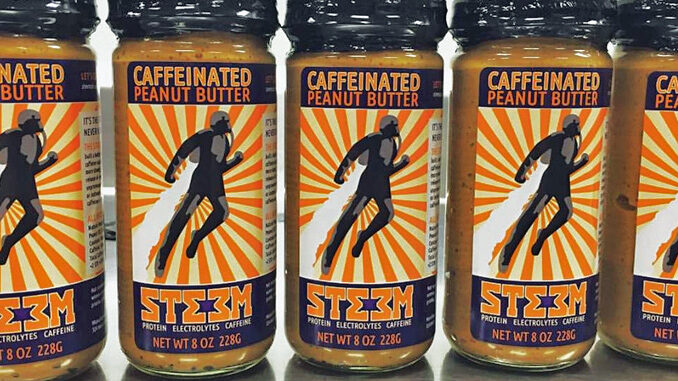
A United States senator from New York is urging the Food and Drug Administration to investigate a caffeinated peanut butter targeting athletes and active people.
Advertisment
Story continues below
Senator Charles Schumer is concerned about the amount of caffeine contained in STEEM peanut butter. The product is currently available for sale online, some fitness centers and small shops in Massachusetts and Connecticut.
STEEM Peanut Butter was launched by three friends in Massachusetts last year. The developers say STEEM delivers protein, electrolytes, and caffeine, “granting you hours of endurance and focus, and freeing you from distractions like hunger and fatigue.”
The Chew Boom’s regular peanut butter eater says STEEM sounds like an energy drink on steroids. That’s a nutty comparison but sounds about right.
A single serving of STEEM caffeinated peanut butter has about 170 mg of caffeine, which is almost twice the caffeine contained in a cup of coffee.
“The thought of super caffeinated peanut butter should give everyone the jitters because of the potential health threat it poses, especially in the hands of children and teenagers,” Sen. Schumer said in a press release.
The makers say STEEM is made with natural peanut butter, no artificial sweeteners and they encourage anyone using their product to stick with the normal serving suggestions for the best effect: “Enjoy it however you would normally enjoy peanut butter.”
“This caffeinated peanut butter should spur the agency to address the issue of caffeine being added to everyday food products and the effect that will have on the health of consumers and children,” The AP quoted Schumer as saying.
“Too much caffeine can cause a person to be jittery — everyone’s experienced that. But it can raise their blood pressure, cause heart palpitations and worse,” added Schumer.
A copy of Schumer’s letter to the FDA is available below.
Dear Acting Commissioner Ostroff:
I write to urge the Food and Drug Administration (FDA), as the federal entity responsible for determining the safe use of food additives, to take immediate action and investigate the use and amounts of caffeine in food products. I know the FDA has been working to better understand caffeine consumption and to determine safe levels for total consumption. However, I believe this work should be expedited in light of the growing trend of caffeine added to food products, most recently caffeinated peanut better.
Caffeine is a powerful stimulant that, when consumed in unsafe amounts, can cause an array of adverse symptoms like nervousness, increased heart rate and increased blood pressure. It can contribute to dehydration and can make heart problems or nerve disorders worse.
Caffeine’s addition to every day foods such as peanut butter is a growing trend that could potentially pose health risks to Americans, especially children. It is disturbing to think that a child could unknowingly consume a whole cup of coffee’s worth of caffeine – or more – with just one serving of caffeinated peanut butter. Currently, caffeine is generally recognized as safe in soft drinks up to a 0.02 percent, or 200 parts per million. However, a can of soda can contain less than half of the caffeine than a single serving of caffeinated peanut butter. We must do all we can to ensure that our food products do not pose an unknowing risk to children’s health if they consume caffeine in this new, potentially dangerous way.
According to the FDA, the average adult has an intake of 200 mg of caffeine per day, the amount in two 5-ounce cups of coffee. The FDA reports that a safe amount of daily caffeine for an adult is 4-5 cups of coffee or 400 mg of caffeine. According to the American Academy of Pediatrics (AAP), while caffeine has been shown to enhance physical performance in adults, these effects are extremely variable, dose dependent, and most importantly, have not been thoroughly studied in children and adolescents. The AAP discourages children and adolescents from having any caffeine because of the potentially harmful developmental and addictive effects of the stimulant.
I applaud the FDA’s oversight of the safety of food additives in the Unites States and your ongoing efforts to ensure that food in this country is safe for consumption. I strongly believe that the increased presence of caffeinated food products, especially peanut butter, should be subject to a thorough investigation. We must avoid exposing our families and children to the potential harmful effects that consuming caffeinated food may lead to.